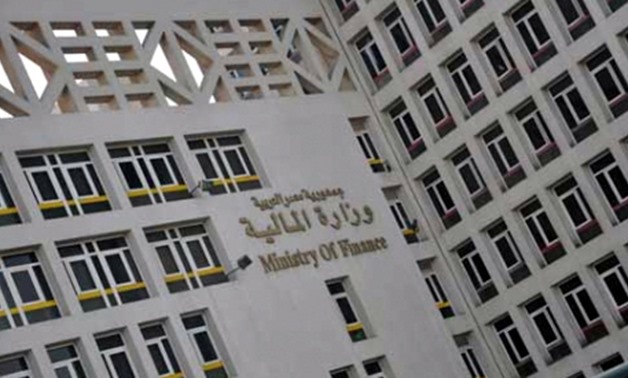
FILE – Finance Ministry
CAIRO – 3 February 2019: The Ministry of Finance, in partnership with all members of the Economic Group and the Central Bank, prepared an integrated strategy to reduce and manage the government debt in the medium term, according to Finance Minister Mohamed Ma’it.
Ma’it added that the strategy was presented to President Abdel Fatah al-Sisi last November to be adopted and published by the president before the end of March 2019 to ensure the sustainability and low proportion of debt to output as a target.
He stated that the ministry succeeded in reducing the debt ratio of budget instruments (domestic and foreign) to domestic product to reach 97 percent of GDP in June 2018 instead of 108 percent of GDP in June 2017 and 103 percent in June 2016.
The minister attributed the success of the debt reduction plan mainly to the first surplus of LE 4 billion in 2017/2018 for the first time in 15 years and an economic growth rate of 5.2 percent.
“Although moving towards achieving high growth rates and reducing public debt rates, the Ministry of Finance aims to reduce the ratio of debt to GDP to 93 percent in June 2019 and then to 88 percent in June 2020, to reach 80 percent in June 2022 in light of targeting an annual first surplus of 2 percent of GDP and achieving annual growth rates of more than 6 percent in the medium term,” he pointed out.
The minister of finance revealed that there is another trend to reduce external debt, pointing out that the ratio of the external debt of the Arab Republic of Egypt to the GDP fell to 36.8 percent in June 2018, compared to 41.1 percent in June 2017.
“The target is to reach about 34 percent of the GDP in June 2019, which means that Egypt's external indebtedness has started to fall within the safe range, according to IMF estimates of 30-50 percent of GDP,” Ma’it elaborated.
For his part, Deputy Minister of Finance for Financial Policies Ahmed Kojak referred to one of the main and direct objectives of the economic and financial reform program being implemented successfully by the Egyptian government which is to reduce the indebtedness of the GDP and get those rates to 80 percent as low as June 2022, that is an assured and good rate of debt according to global estimates.
He added that these debt targets will ensure the sustainability of government debt, reduce the debt service bill and provide additional financial allocations to finance productive economic activities such as government investments, improving infrastructure and financing some productive projects.
“The available financial space can also be used to increase government funding for targeted social protection programs or improve public services,” he noted.
He explained that the Ministry of Finance succeeded in long-term borrowing from international markets and using a part of these funds to repay the short-term foreign debt, which is in the treasury bills denominated in dollars and foreign currencies exported to local banks.
Moreover, he noted that the ministry succeeded in reducing the outstanding balance of dollar during 2018 by $3.25 billion as the balance reached about $14 billion by the end of December 2018, which was reflected positively on indicators of measuring domestic indebtedness by prolonging the life of debt and reducing the vulnerability of indebtedness to exchange rate fluctuations and the risk of refinancing these short-term debts.
Ministry of Finance implemented a number of measures and proposals during the past months, as shown in the following points, to reduce the increase in debt service bill and to improve and prolong the structure of government debt:
1. The introduction of new financing tools for investors in the local market and the issuance of zero coupon bonds for periods of 1.5 -2 years, which helped to extend the date of payment of debt service for the following years with an item allowing the Ministry of Finance to recover those bonds after three months in case interest rates dropped in the domestic market.
2. These issuances will increase the life of the tradable domestic debt portfolio, which has been praised by the international financial institutions, especially the Euro-Claire Bank, with which the Ministry of Finance is currently working to link the government securities market and facilitate foreign investors' access to the Egyptian market, especially Central banks and international financial institutions, because of the euro-zone's availability of multi-currency and the risk of compromising those institutions.
3. The expansion of the ministry's long-term issuances will also facilitate the inclusion of government securities in the JP Morgan Index, which will stimulate and increase the demand side of passive investment investors when building their portfolios.
4. The Ministry of Finance successfully conducted a non-promotional tour of the most important financial centers in East Asia during the period October 2018 to January 2019, including: China, Korea, Singapore and Japan. They are set to visit the Gulf States in February 2019 and Korea again at the end of February 2019; in addition to China and Hong Kong during March 2019.
These measures have contributed to reducing the estimates of the debt bill for 2018/2019 by LE 30 billion (representing 0.6 percent of GDP and about 6 percent of the targeted interest bill), Which increases the fiscal ability to achieve the budget targets, despite the large raise in the average interest rates on domestic bills and bonds compared to the assumptions made when preparing the budget in March.

Comments
Leave a Comment